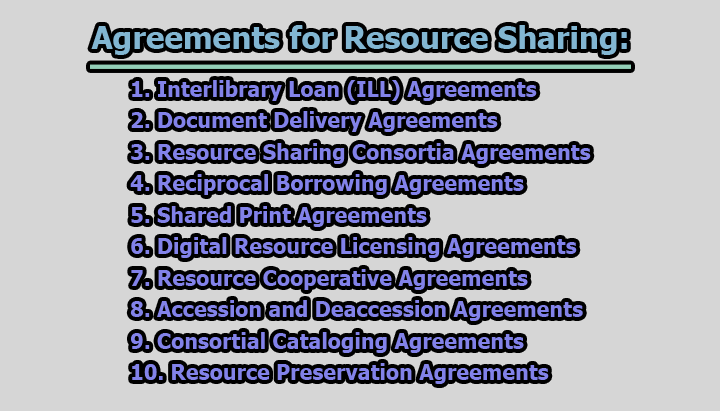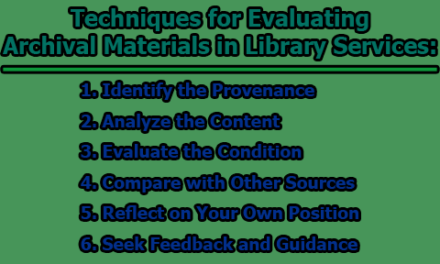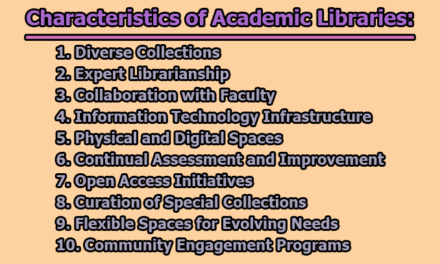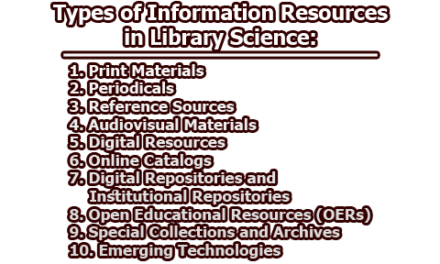Agreements for Resource Sharing:
Resource sharing agreements are formal agreements or contracts established between libraries, library consortia, or institutions to facilitate the sharing of materials, services, and resources. These agreements outline the terms, conditions, responsibilities, and expectations of both borrowing and lending institutions. They are essential for ensuring smooth and effective resource sharing processes. Here are some common types of agreements for resource sharing:
- Interlibrary Loan (ILL) Agreements:
- These agreements govern the borrowing and lending of physical materials (e.g., books, journals, DVDs) among libraries.
- They specify loan periods, renewal policies, borrowing restrictions, fees (if applicable), and procedures for requesting and returning materials.
- ILL agreements often adhere to national or regional ILL codes and standards.
- Document Delivery Agreements:
- Document delivery agreements focus on the delivery of copies of articles, book chapters, reports, and other documents from one library to another.
- They define the terms for requesting, delivering, and paying for document delivery services.
- These agreements often consider copyright compliance and fair use guidelines.
- Resource Sharing Consortia Agreements:
- Libraries within consortia or networks often establish resource sharing agreements to coordinate their collective efforts.
- These agreements cover various aspects, including shared cataloging, cooperative collection development, access to digital resources, and collaborative services.
- Consortia agreements typically outline the roles and responsibilities of member institutions.
- Reciprocal Borrowing Agreements:
- Reciprocal borrowing agreements allow patrons from one library to borrow materials directly from another library within the agreement.
- These agreements are common among academic libraries or public libraries within a region.
- They specify eligibility criteria, borrowing privileges, and responsibilities of participating libraries.
- Shared Print Agreements:
- Shared print agreements are established to collectively manage and preserve print collections among libraries.
- Libraries agree to retain certain print materials and provide access to others within a shared print repository.
- These agreements address storage, retention periods, access policies, and withdrawal processes.
- Digital Resource Licensing Agreements:
- Libraries often negotiate licensing agreements for digital resources, including e-books, e-journals, and databases.
- These agreements define terms of access, usage restrictions, subscription costs, and terms for sharing digital content within a consortium or network.
- Resource Cooperative Agreements:
- Resource cooperatives are formal agreements among libraries or institutions to jointly acquire, manage, or license resources.
- They cover the purchase, sharing, or maintenance of resources such as databases, digital content, or consortial services.
- Resource cooperatives may also address cost-sharing and governance.
- Accession and Deaccession Agreements:
- These agreements are used in shared print or shared collection management initiatives.
- Libraries agree on the criteria for adding new materials to shared collections (accession) and for removing materials (deaccession) based on preservation or relevance considerations.
- Consortial Cataloging Agreements:
- Libraries within consortia often cooperate on cataloging efforts to reduce duplication of cataloging work.
- These agreements define cataloging standards, metadata sharing protocols, and responsibilities for maintaining bibliographic records.
- Resource Preservation Agreements:
- Resource preservation agreements focus on the cooperative preservation and digitization of materials, particularly rare or deteriorating items.
- They outline preservation priorities, responsibilities, digitization standards, and access policies.
These agreements vary in scope and complexity, depending on the resources being shared and the goals of the participating institutions. Clear and well-defined agreements are crucial for effective resource sharing, ensuring that all parties understand their roles and obligations.

Library Lecturer at Nurul Amin Degree College










